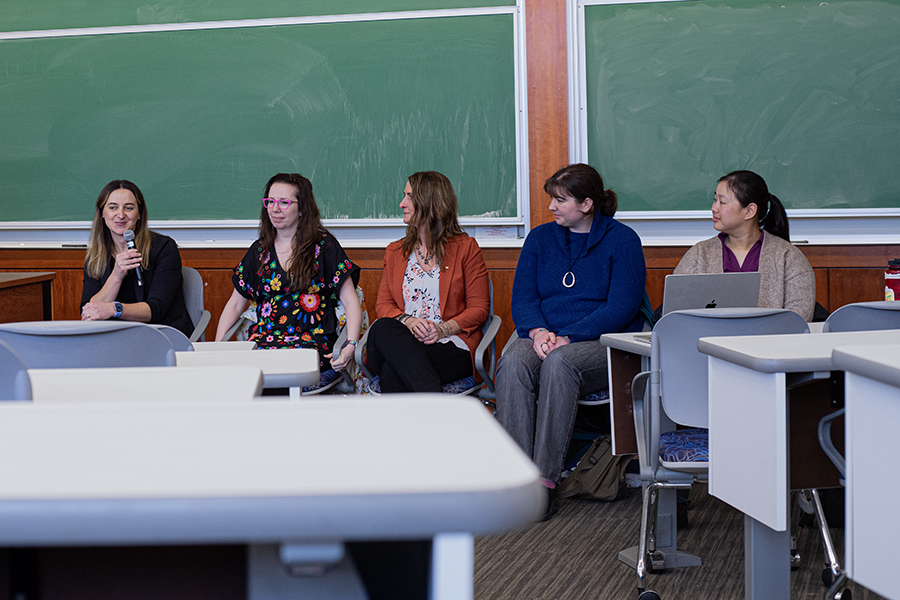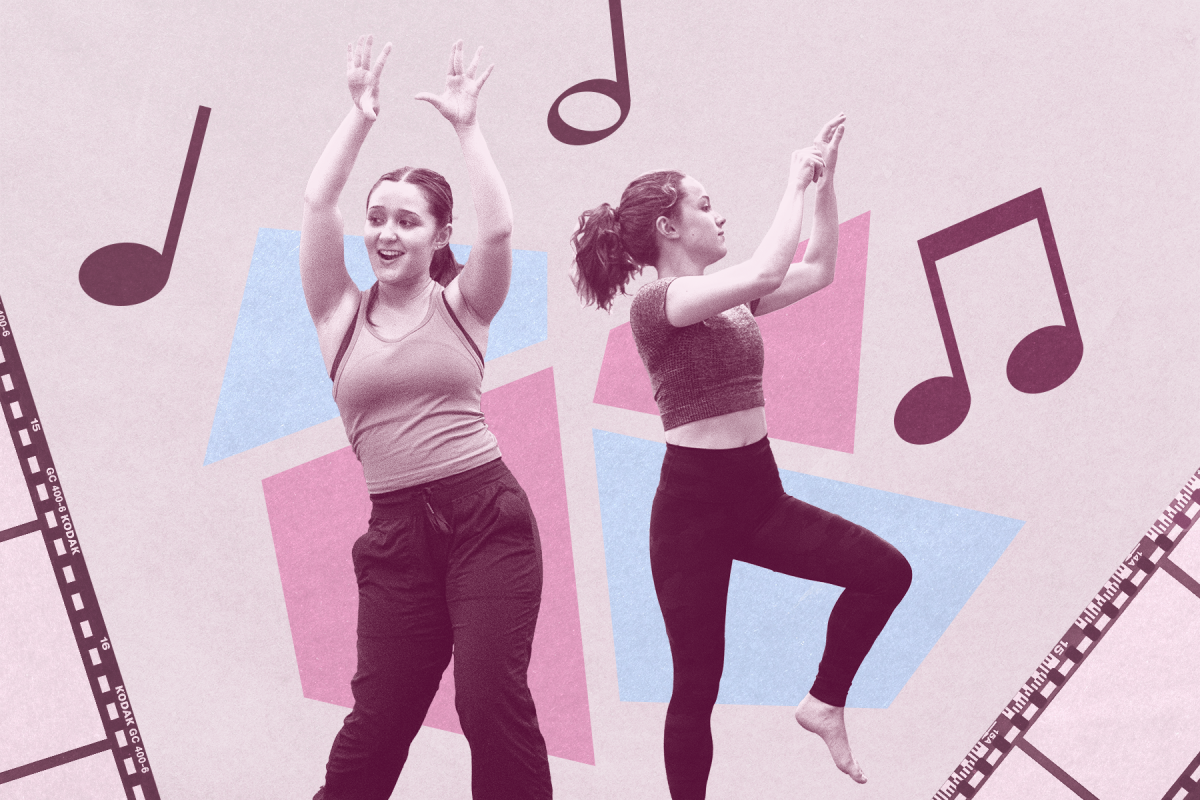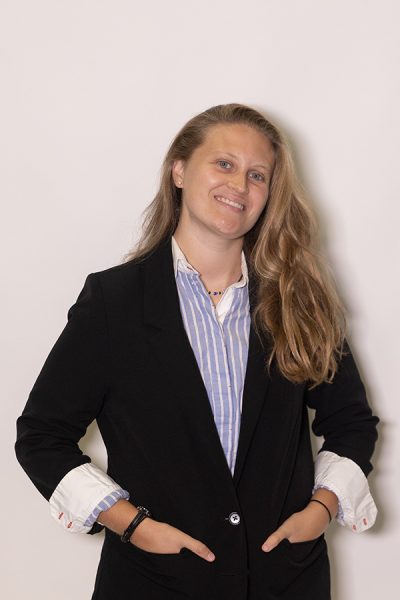Ithaca College’s Women in Math Day was held March 2 for the first time in person since the COVID-19 pandemic. The event was organized by Megan Martinez and Ted Galanthay, associate professors in the Department of Mathematics.
Martinez said the event originally began in 2018 after the department received the Tensor Women and Mathematics grant from the Mathematical Association of America. The Tensor Foundation promotes pre-college and college-aged women and girls to learn and study math. Martinez said the grants the college received in 2018 and 2019 awarded the department $6,000 each and are still funding the event.
Martinez said her and Galanthay’s mindset for the 2024 event was to introduce it back into the community. She said the event was created with the interests of the participants in mind.
“It’s kind of like we’ve taken a three-year hiatus with the event [and] now we’re in person again,” Martinez said. “So we’ve kind of lost all the community knowledge of the event because it went international for a bit. Ted and I are constantly thinking about, ‘Are we running the event in such a way that it’s what people want to do or the experience that they want?’”
The event was in the Business School atrium and hosted prospective students, their families and panelists from the local Ithaca community. The panelists were Alex Chernyakov, assistant professor of electrical engineering at Tompkins Cortland Community College; Marguerite Davis ’18, an instructor at Mathnasium; Tiffany Ho, data analyst at the Tompkins County District Attorney’s Office; Deborah Hoover, vice President and small business lending manager at Tompkins Community Bank; and Cassandra Valenti, a math teacher at Ithaca High School.
The grant has been used by the college to host a Women in Math Day that educates local high school students about the college’s math program. Martinez said that while International Women in Mathematics Day is May 12, she made the day coincide with school district calendars to target high school students for the event.
“In earlier days, [the grant] was [used to] support bringing female speakers to campus,” Martinez said. “It was supporting a mentoring program in the Department. And so since then, we’ve honed in on a few things. The biggest thing we do is this Women in Math Day.”
After the pandemic, the department’s Women in Math Day was held virtually. During the fifth annual Women in Math Day in 2022, approximately 30 participants attended the event, which was hosted by three professors in the Department of Mathematics. The event had five career panelists speak virtually and seven Ithaca College student volunteers majoring in math spoke with the participants, according to The Ithacan. Similarly, during the event’s sixth annual Women in Math Day in 2023, the event hosted participants from grades seven to 12 over Zoom, along with four virtual panelists.
The program ran similarly to how it was run virtually. There were two in-person participants and eight participants over Zoom. The event began with the two in-person student participants learning game theory, a branch of math that analyzes strategy and decision-making.
Before the panelists spoke, participants had the opportunity to have lunch with current math majors at the college. Senior Lenley Aikin was one of the volunteers and said it was her third year volunteering at Women in Math Day, but the first time she was able to speak with participants in person.
“Honestly, it feels more exciting,” Aikin said. “This event just feels more like, ‘Oh my gosh, this event is in person and you can interact with other people,’ rather than on Zoom, some people wouldn’t turn on their cameras. And being in breakout rooms with us, the student panelists, the students [over Zoom] would be too shy to ask questions.”
Aikin said the event is important to maintain, despite low attendance, because of the gender gap within math. Female U.S. high school students made up 61% of AP biology students, 52% of AP statistics and 50% of AP chemistry students and represented 23% of AP computer science and 29% of AP physics students, according to a 2018 National Science Foundation article.
“There is such a gender gap in STEM fields, specifically mathematics,” Aikin said. “I think part of that gender gap leads to other people being hesitant to step their foot in such a male-dominated industry, even if they really enjoy doing this.”
Chernyakov spoke about current engineering methods, specifically about the way cars are engineered for men, not for women. Women are 73% more likely to be severely injured in a car crash as opposed to men, according to The New York Times.
“Women see the importance of engineering for women,” Chernyakov said. “Then [engineering] becomes more true to gender, truer to race and to women.”
Martinez asked the panel what the most rewarding parts of the women’s jobs are. Chernyakov said she had a small win when a student of hers — who only took one engineering course with her — tried engineering and has now decided to pursue it. Chernyakov said that teaching engineering to women is valuable to decrease the gender gap.
“20 years ago, engineering had less than 10% of female students,” Chernyakov said. “Now, 20 years later, the numbers are 12–14%. I am super passionate about doing what I can to change it.”
When asked how she uses math in everyday life, Hoover said as a small business loan manager at Tompkins Community Bank, she uses math to calculate if people can afford a loan with their current income. Hoover said that although she did not finish her degree when she began college to start a family, she has found herself doing something she cares about. Hoover said she finally received her Associate’s Degree in 2009 in Business Administration. She recommended that the prospective students take at least one course in economics.
“Economics is very helpful and will help you understand what is happening in our country and in the world,” Hoover said. “Also make sure to take a finance course.”
Valenti also spoke about courses to take in college and said statistics is important to understand society through a mathematical lens. Valenti said getting her students to care about taking math classes can be hard, but said learning math is essential to think through a problem logically, no matter the problem.
“As a math teacher, we do math in a very traditional sense,” Valenti said. “My students always ask me, ‘When am I going to use this negative exponent, Ms. Valenti?’ And I tell them, ‘Well you might never use that negative exponent again but I bet because you went through this thought process of thinking about these things, you solved this problem, that is the key word, to solve problems, which everyone has to do no matter their career.”
Amelia Grimshaw is a high school senior in the Syracuse City School District and said she is a prospective biology student at the college. She said her plans after college are to become a forensic scientist. Grimshaw said the Women in Math Day interested her because the sciences are so intertwined with math.
“I like the prospect of a women in math day and just being able to come and see what Ithaca [College] has to offer and seeing it being presented by women,” Grimshaw said. “It felt really reassuring to see women in a math space or in STEM in general.”















